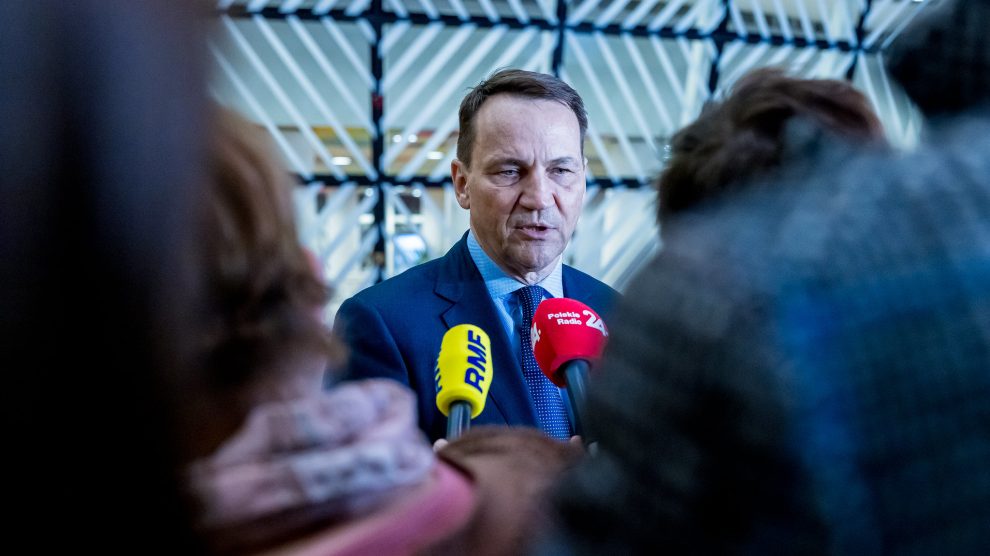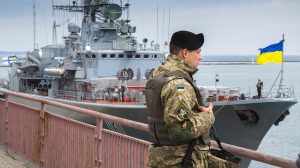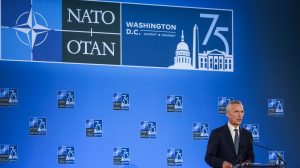Catch up quickly with the stories from Central and Eastern Europe that matter.
Russia’s war on Ukraine
Polish Foreign Minister Radosław Sikorski this week said he is trying to “put some urgency” into providing ammunition and defence systems to avoid a “too little, too late” scenario as Ukraine fights off Russia’s full-scale invasion.
Speaking in an interview with RFE/RL on the sidelines of an EU foreign ministers meeting on Monday, Sikorski said that, when he reflects on warnings he issued when he was Poland’s foreign minister in 2014 about the danger of Russian intentions in Ukraine, Europe wasn’t prepared to do anything about it.
“We might still be just like 10 years ago in the logic of too little, too late,” he said, stressing that Ukraine urgently needs ammunition and ways to protect its cities and infrastructure.
Slovakia’s Russia-friendly prime minister this week made an unexpected U-turn on Ukraine, pledging support on his first trip to the war-torn country only days after questioning Ukrainian sovereignty.
Robert Fico, who came to office in October after campaigning to sever his nation’s military aid to Kyiv and oppose further sanctions against Russia, on Wednesday met his Ukrainian counterpart Denys Shmyhal in the city of Uzhhorod, near the Slovak border.
Fico claimed there were only “minor” political differences with Kyiv, which were part of “political life”, adding: “We really want to assist you, we really want to help you.”
Shmyhal responded that he stood ready to develop “pragmatic and very reliable relations” between the two countries.
High-ranking Russian officials were supposed to be on board the Il-76 aircraft that crashed in Belogorod Oblast on Wednesday, but the Federal Security Service (FSB) did not allow them to board at “the last moment,” Andrii Yusov, Ukraine’s military intelligence spokesperson, told RFE/RL on Thursday.
The Il-76 transport plane crashed in Russia’s Belgorod Oblast on Jan. 24, allegedly killing everyone on board. Russia’s Defence Ministry then claimed that 65 Ukrainian POWs had been on the plane due to a scheduled prisoner exchange later that day.
Ukraine’s military intelligence agency did not confirm whether prisoners were on the plane, nor commented on what might have caused the crash, but said a prisoner exchange had been planned for that day.
According to Yusov, Ukrainian intelligence suggests that several senior military and political officials should have been on board but were instead told by the FSB to use other modes of transport.
Yusov said that this information became known to Ukrainian intelligence after the plane crashed.
Other news from the region
Polish President Andrzej Duda on Tuesday pardoned two members of the former government, who were then released from prison at his urging, in line with demands from the main opposition Law and Justice (PiS) party that lost power last month. Former interior minister Mariusz Kamiński and his deputy Maciej were jailed this month after being sentenced for abuse of power in their previous roles. Both men went on hunger strike, claiming to be “political prisoners”, and their jailing triggered large protests by tens of thousands of PiS supporters.
The leaders of the six Western Balkan countries pledged on Monday to make full use of the European Union‘s financial support plan of six billion euros as they continue to seek membership in the bloc. Serbia, Kosovo, Bosnia and Herzegovina, Montenegro, North Macedonia and Albania are at different stages of the accession process. Their leaders gathered in North Macedonia’s capital, Skopje, and said in a joint statement they were committed “to the development of their countries to follow European standards.”
At the same meeting, however, European Commission President Ursula von der Leyen, Dutch Prime Minister Mark Rutte and Croatian Prime Minister Andrej Plenković warned Bosnia that it will miss the chance to start EU accession talks this year if it does not adopt the laws demanded by the EU within the next six weeks. “If March is missed, this whole year will be lost in terms of making positive decisions about Bosnia. There are no doubts about that,” said Plenković after the meeting, adding that this is an election year within the EU.
Moldovan Foreign Minister Nicu Popescu announced his resignation during a press briefing in Chisinau on Wednesday, saying that he has achieved the goal set for him by pro-Western President Maia Sandu to bring Moldova, one of Europe’s poorest countries, closer to integration into the European Union. Mihai Popsoi, the Moldovan parliament’s deputy speaker and a member of Sandu’s governing Action and Solidarity (PAS) party, will become foreign minister, while Cristina Gherasimov, currently one of the three deputy foreign ministers, will be put in charge of a recently created European Integration Bureau.
At least 64 people were detained across Belarus this week on charges of “involvement in extremist groups” and “financing extremist activities,” accusations routinely used to target dissenters. The authorities on Tuesday arrested several dozen people in raids marking the latest crackdown on dissent, a local human rights centre said. The Viasna Centre said that some political prisoners who had been released after serving their sentences were among those arrested. Belarusian opposition leader-in-exile Sviatlana Tsikhanouskaya condemned the arrests and said, “No one can feel safe in our country.”
Crypto bank Nexo has filed a record three billion US dollars billion lawsuit against Bulgaria over the actions of prosecutors and other state institutions against its executives, the company said on Wednesday. It is the largest lawsuit ever brought against Bulgaria. “The amount of the arbitration claim is determined by the significant material and reputational damages resulting from the actions of the institutions during the now terminated, oppressive investigation against the company, its employees and executives,” Nexo claims.
The EU and US have expressed concern over the timing of the enforcement in Kosovo of a regulation reinforcing the euro as the only official currency, especially in Serb-majority municipalities that use Serbia’s dinar on a daily basis. According to Kosovo’s national bank, the new rules, which enter into force on February 1, are designed mainly to fight the flow of counterfeit money. Kosovo has been using the euro since 2002, but people in Serb-majority municipalities in the north of the country use both Serbian dinars and euros.
Uzbekistan and China have set their sights on increasing their trade turnover to 20 billion US dollars “in the near future,” following high-level negotiations in Beijing on Wednesday between Uzbek President Shavkat Mirziyoyev and Chinese leader Xi Jinping. Bilateral trade in 2023 hit the 14 billion US dollars mark. A statement on the Uzbek president’s website attributed this trajectory to the “powerful breakthrough made in bilateral relations” in recent years. According to Mirziyoyev’s office, Chinese investment in Uzbekistan’s economy has seen a fivefold increase “in recent years.”
Romania this week became the latest country from emerging Europe to pull out of the Eurovision Song Contest, citing the excessive cost of taking part. Also absent from the contest in Malmo, set to take place on May 11, will be Bosnia and Herzegovina, Bulgaria, Hungary, Montenegro, North Macedonia, and Slovakia. Eurovision is funded by the host broadcaster and the other participating broadcasters who pay a fee to take part. While the European Broadcasting Union, which organises the event, does not make public the numbers involved, costs in recent years have reportedly run to the tens of millions of euros.
Photo: Polish Foreign Minister Radosław Sikorski. (Sebastian Indra / Poland MFA; CC BY-NC 2.0 DEED).
Unlike many news and information platforms, Emerging Europe is free to read, and always will be. There is no paywall here. We are independent, not affiliated with nor representing any political party or business organisation. We want the very best for emerging Europe, nothing more, nothing less. Your support will help us continue to spread the word about this amazing region.
You can contribute here. Thank you.







Add Comment